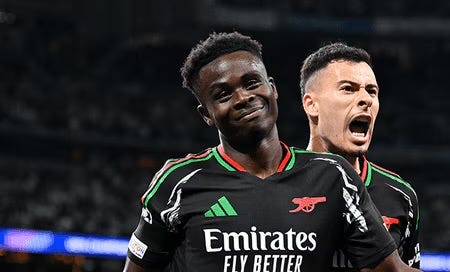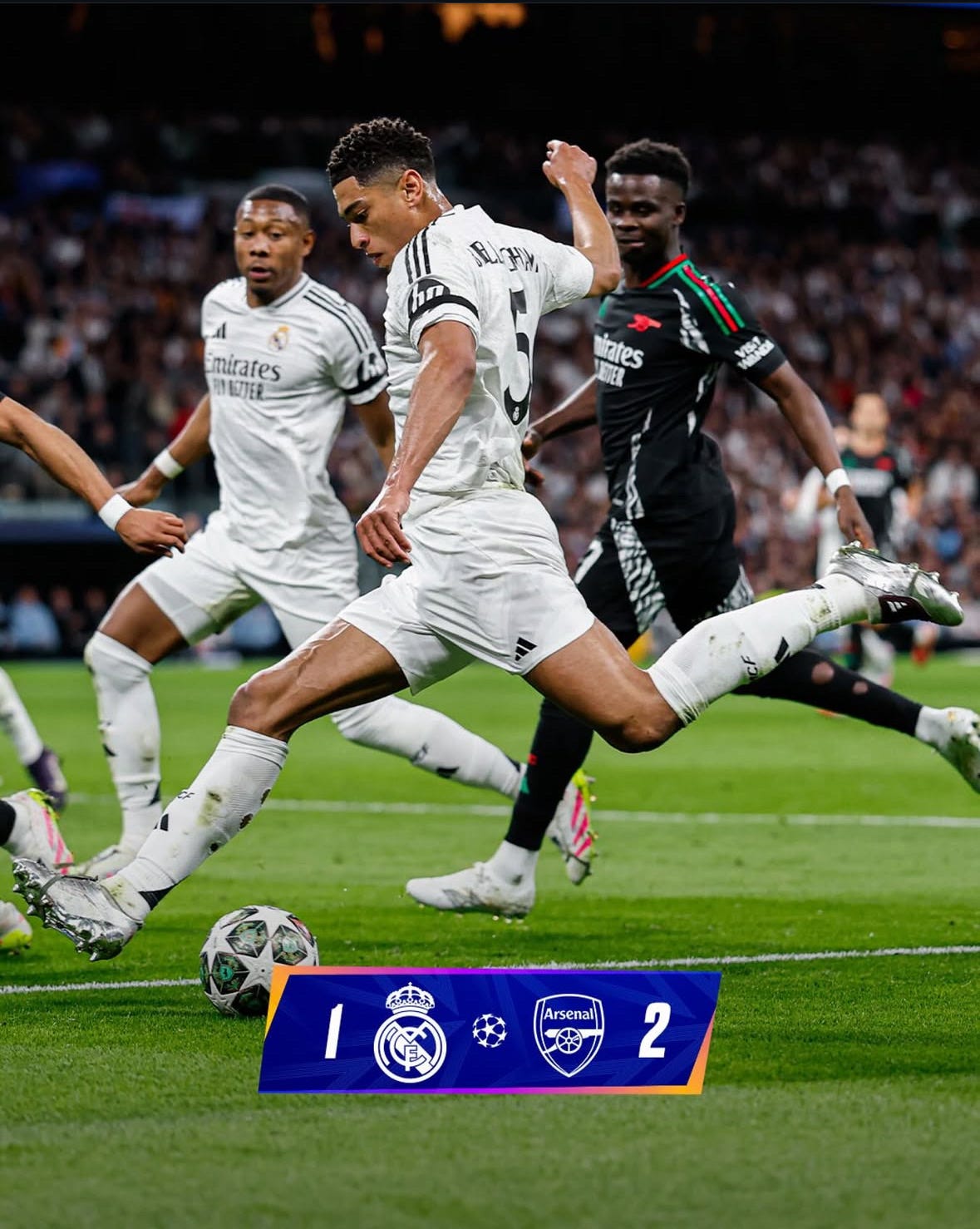For eight days, the most popular word in football was La Remontada — The Comeback. Real Madrid, three goals down to Arsenal, were preparing to turn history into fuel.
The world of football was swept up in the weight of that fixture. Other games felt secondary. Real Madrid sold the idea of a comeback not on current form, but on memory — on the power of their past.
Such is the pull of reputation: old miracles begin to feel possible, even when the cracks are showing. Madrid had gaps — technical, tactical, emotional. They tried to fill them with myth. But myth isn’t a match plan. And it showed.
Real Madrid have staged so many famous comebacks that even the staunchest Arsenal fan couldn’t feel safe. A 3-0 lead didn’t guarantee anything. Madrid had earned that kind of respect — through scars they’ve left on others.
All week, the air around this tie carried the scent of belief. Not because Madrid were brilliant this season — they weren’t — but because they’ve done this before. Against English clubs. Against elite sides. Against the odds.
And they made us believe, if only for a moment. After Bukayo Saka opened the scoring, William Saliba gifted Vinícius Jr. an equalizer. The Brazilian raised his arms, summoning the crowd. The stadium responded — loud, hopeful, electric. It was muscle memory. Real Madrid had seen this movie before.
But this time, the ending changed.
Gabriel Martinelli’s winner followed, sealing Arsenal’s dominance across both legs. 5-1! The Bernabeu roared, but the spark was gone. Remontada was dead — there and then. Not to wake that day.
Arsenal weren’t there to survive history. They came to write something new.
This is their first Champions League semifinal in sixteen years — only the third in their history. Since their last, five other English teams have made it that far. Against a club like Madrid, who act like the Champions League is a birthright, Arsenal had something to prove. That they belong. That they’ve arrived. That they’re no longer dreaming — they’re doing.
Despite a slight dip this season, Arsenal remain one of Europe’s most complete squads: young, balanced, well-structured, and hungry. Real Madrid, by contrast, looked wounded — missing key players and clutching to echoes. The timing couldn’t have been better for Arsenal to tell their story.
They didn’t get drawn into the circus. They’d done their talking in the first leg. The second leg was about composure — managing the lead, seizing chances, showing maturity. They did all three.
The noise around remontada felt more like fear disguised as defiance. Real Madrid pushed the myth hard — through media, moments, gestures. But Arsenal weren’t listening. They kept their focus. No drama. No panic. Just business.
Real Madrid, for all their talent, lacked the tactical sharpness and energy to spark anything meaningful. Arsenal won. That’s the story.
Sure, Real Madrid missed pieces: injuries in defence, Bellingham not quite at his best, Vinícius inconsistent, Kroos retired. But what could have been doesn’t matter when the job is finished.
Stylistically, Real Madrid have stumbled all season. They’ve looked disjointed, especially when tasked with dictating play. Against a side like Arsenal — compact, aggressive, confident — that vulnerability was exposed.
Across both legs, Arsenal were comfortable. Their only Champions League loss this season was to Inter, in a match they largely controlled. Real Madrid offered no such resistance. They didn’t sit deep or press well — and Arsenal, against that kind of disorganisation, thrive.
More than flair, it was desire that separated the sides. Arsenal simply wanted it more. Declan Rice was immense over both legs — the defining figure in midfield. He embodied the performance: controlled, relentless, unfazed. It was a coming of age.
The Bernabeu can swallow teams whole. It nearly swallowed Arsenal — but they stood tall. Never rattled. Never reactive. Just ruthless.
Real Madrid had hyped remontada like never before. It became a marketing tool, a psychological weapon. But in the end, it was empty. Words don’t win knockout ties. Playing football does.
Now, questions linger around Carlo Ancelotti’s future. He’s delivered incredible moments in his second spell — legendary comebacks and deep runs — but this might be the end of that road. The memories are heavy. But even the best stories close eventually.
The Bernabeu has hosted many of those memories — its open roof under the Madrid sky watching some of the greatest nights in football. That night, it was closed. Tense. Loaded. Ready for war. But Arsenal were ready too.
Mikel Arteta’s approach was direct: avoid transitions, use the wings, control the middle. Saka and Martinelli were kept involved. Rice, Partey and Ødegaard set the rhythm. Arsenal simply outran and outthought Real Madrid.
It felt like the closing of a chapter. A curtain call on one era. But also, the likely rise of another. Jurgen Klopp has been mentioned. Noise is coming. Lots of it.
Real Madrid remain a galaxy of stars — managed by one of the greatest minds football has known. But without desire, even stars go dim. Closed roofs can’t protect a team from a lack of purpose.
Arsenal had it all. Belief, discipline, energy. They didn’t just survive the Bernabeu — they owned it.
They took the final bow.





